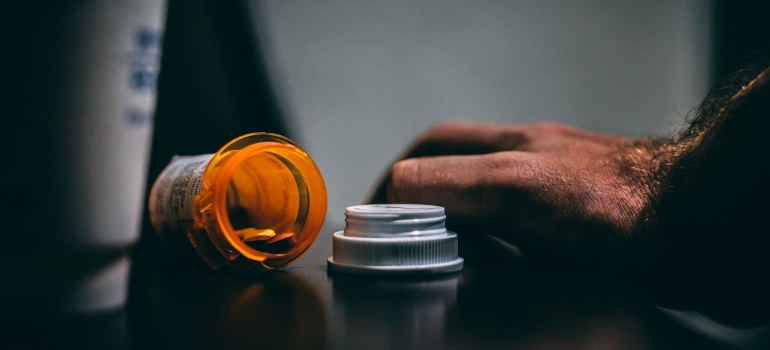Demerol (meperidine) is a prescription opioid often used to manage moderate to severe pain. While effective for short-term relief, long-term or improper use can lead to dependency and addiction. Many individuals find themselves struggling with the overwhelming grip of this drug, unaware of the challenges associated with stopping its use. We will explore Demerol withdrawal symptoms, their duration, and the recovery process. If you or a loved one are dealing with Demerol withdrawal, it’s important to understand the path to recovery and the resources available, including drug and alcohol treatment centers in West Virginia. Let’s dive deeper into what makes Demerol addictive and how to manage its withdrawal safely.
What Is Demerol and Why Is It Addictive?
Demerol is a synthetic opioid primarily prescribed to alleviate pain after surgery or during acute medical conditions. It works by binding to opioid receptors in the brain, which blocks pain signals and releases dopamine. This surge of dopamine creates feelings of relaxation and euphoria, which can make the drug highly appealing.

In 2023, approximately 3.1% of individuals aged 12 or older in the United States, reported misusing opioids in the past year. The effects of Demerol are often short-lived compared to other opioids, leading individuals to take more frequent doses to sustain the euphoric sensations. This pattern significantly increases the risk of dependency. Over time, the brain begins to rely on Demerol to release dopamine. Natural production of dopamine decreases, leaving individuals unable to experience pleasure or manage pain without the drug. Risk factors for addiction include:
- Using Demerol for extended periods.
- Taking higher doses than prescribed by a healthcare provider.
- Using Demerol recreationally or without a prescription to achieve a high.
- Having a history of substance abuse or mental health issues.
Recognizing these risks early and taking steps to manage pain with alternative methods can prevent dependency and addiction. Individuals in West Virginia have access to programs like opiate rehab West Virginia to address such dependency safely.
What Is Demerol Withdrawal?
Withdrawal occurs when the body, accustomed to the presence of Demerol, reacts to its absence. Dependence on Demerol affects both physical and psychological systems, and withdrawal is the body’s way of attempting to regain balance.
When someone becomes dependent on Demerol, their brain adapts to the drug’s effects by reducing its natural production of neurotransmitters. As a result, the sudden removal of Demerol leads to a state of imbalance, triggering a variety of withdrawal symptoms. This process can be physically and emotionally distressing. The intensity of withdrawal often depends on factors such as:
- The duration of Demerol use.
- The dosage regularly consumed.
- The individual’s overall physical and mental health.
Withdrawal is a natural part of overcoming addiction, but it’s also a time when professional support is necessary to ensure safety and success.

Demerol Withdrawal Symptoms
Withdrawal symptoms can vary based on an individual’s usage history, dosage, and overall health. They generally fall into two categories:
Physical Symptoms
- Nausea and vomiting: These symptoms are among the most common and can lead to dehydration if not managed properly.
- Sweating and chills: Many individuals experience intense temperature regulation issues, alternating between sweating and chills.
- Muscle aches and cramps: These can feel debilitating and are often described as flu-like symptoms.
- Diarrhea: Another common symptom that can exacerbate dehydration.
- Insomnia or disrupted sleep patterns: The inability to sleep worsens other symptoms and can make the withdrawal process feel longer.
Psychological Symptoms
- Anxiety and restlessness: Individuals often feel on edge or unable to relax.
- Irritability: Small frustrations can feel overwhelming.
- Depression: The lack of dopamine production can lead to prolonged feelings of sadness or hopelessness.
- Intense cravings for Demerol: These cravings can dominate thoughts and increase the risk of relapse.
Programs like stimulants rehab offer targeted support for managing symptoms related to withdrawal from multiple substances, helping individuals through both physical and psychological challenges.
How Long Do the Consequences of Demerol Withdrawal Last?
The timeline for withdrawal varies but often follows a predictable pattern:
Acute Phase (First 24-72 hours)
- Intense physical symptoms like nausea, sweating, and muscle pain peak during this time.
- Sleep disturbances are common, making this phase physically and emotionally exhausting.
- Many individuals report difficulty focusing or functioning due to the overwhelming nature of symptoms. Seeking medical support during this phase can significantly ease discomfort and prevent complications.

Subacute Phase (Days 4-10)
- Physical symptoms begin to subside. However, emotional and psychological symptoms like anxiety, depression, and cravings become more prominent. Many individuals describe this phase as a mental battle, as cravings and mood swings dominate.
- During this time, individuals may also experience lingering fatigue or physical discomfort, which can interfere with daily tasks. Maintaining hydration and nutrition becomes increasingly important to support recovery.
- Professional counseling or support groups can provide emotional stability and reduce the risk of relapse during this critical period.
Post-Acute Withdrawal Syndrome (PAWS)
- Lingering effects, including mood swings, sleep problems, and depression, may persist for weeks or even months. This phase can test an individual’s resolve, making aftercare and ongoing support necessary.
- Many individuals in this phase experience episodic symptoms that seem to come and go, which can be frustrating and challenging. Patience and consistent follow-up care are crucial to managing these symptoms effectively.
- Activities like regular exercise, mindfulness practices, and structured daily routines can help ease PAWS and improve overall well-being.
Understanding these phases and their challenges highlights the importance of professional support and long-term strategies to manage withdrawal and sustain recovery. Accessing substance abuse treatment WV can provide necessary resources for managing these long-term symptoms effectively.
Risks and Complications of Demerol Withdrawal
Attempting to detox from Demerol without medical supervision can be dangerous. Self-detoxing often leads to:
- Dehydration: Intense vomiting or diarrhea can quickly lead to fluid loss, which can become life-threatening if untreated. Proper hydration and medical intervention are critical to avoid serious complications.
- Relapse: The body’s cravings for Demerol can make relapse likely. Relapsing after a period of abstinence increases the risk of overdose due to reduced tolerance. Without proper guidance, individuals often underestimate the reduced dosage needed to avoid an overdose.
- Emotional instability: Anxiety and depression may feel unbearable without proper support. These emotions often drive individuals back to substance use as a way to cope. In severe cases, untreated emotional distress during withdrawal can escalate into self-harm or suicidal thoughts.
- Physical health complications: Pre-existing conditions can worsen during withdrawal, particularly if symptoms are severe. For example, chronic pain or cardiovascular conditions can become harder to manage without medical oversight.
- Withdrawal mismanagement: Some individuals attempt to use over-the-counter medications or other substances to manage symptoms, which can lead to dangerous drug interactions or new dependencies.

Seeking professional care ensures a safer withdrawal process by managing symptoms and reducing complications. Medical detox programs provide 24/7 monitoring, medications to alleviate symptoms, and psychological support to navigate the challenges of withdrawal. Additionally, professional settings offer a controlled environment where individuals are shielded from triggers that could lead to relapse. For individuals in need, drug rehab for young adults provides a specialized environment tailored to those who may require a different approach to managing withdrawal risks.
By understanding the risks and addressing them proactively with professional help, individuals can significantly reduce the dangers associated with Demerol withdrawal and take a solid step toward recovery.
How to Safely Manage Demerol Withdrawal
The safest way to manage withdrawal is through a structured medical detox program. These programs combine medical care, therapeutic support, and holistic approaches to address the challenges of withdrawal comprehensively.
Medications for Withdrawal Relief
Medications play an important role in easing the physical and emotional discomfort of withdrawal. Options often include:
- Buprenorphine or methadone, which help reduce cravings and stabilize the individual during detox.
- Clonidine, which manages symptoms such as sweating, muscle pain, and high blood pressure.
- Over-the-counter medications to treat minor symptoms like nausea, diarrhea, and headaches.
Proper medication use under professional supervision ensures safety and effectiveness, reducing the likelihood of complications.
Choosing Between Inpatient and Outpatient Detox
The decision between inpatient and outpatient detox depends on the severity of the addiction and the individual’s personal circumstances:
Inpatient Detox
- Provides 24/7 monitoring and care in a controlled environment.
- Best suited for individuals with severe addiction, co-occurring mental health conditions, or a lack of support at home.
- Offers immediate access to medical and emotional support during challenging moments.
Outpatient Detox
- Allows individuals to live at home while attending scheduled treatment sessions.
- Suitable for those with milder addictions and a strong, supportive home environment.
- Offers flexibility, enabling individuals to maintain work or family commitments during treatment.
Holistic Support for Recovery
In addition to medical care, holistic therapies help the body and mind heal during withdrawal. Effective strategies include:
- Nutrition and Hydration: Proper meals and fluid intake replenish the body’s strength and address deficiencies caused by addiction.
- Relaxation Techniques: Practices like yoga, meditation, and deep-breathing exercises reduce stress and promote a sense of calm.
- Physical Activity: Even light exercises, such as walking or stretching, can improve mood and energy levels, aiding the recovery process.
Combining these approaches ensures that withdrawal management addresses the whole person, rather than just the symptoms. This comprehensive care ensures a smoother recovery journey and reduces the risk of relapse.
Recovery After Demerol Withdrawal
Detoxing is just the first step. Recovery involves addressing the psychological and behavioral aspects of addiction. Comprehensive treatment programs provide tools to maintain sobriety and build a healthier future. Components of effective recovery include:
Counseling and Therapy:
- Cognitive Behavioral Therapy (CBT) to identify and change negative thought patterns.
- Group therapy to share experiences and find support. Being part of a community helps reduce feelings of isolation.
- Individual therapy sessions to explore personal triggers and develop coping mechanisms.

Relapse Prevention Plans:
- Strategies to avoid triggers and manage cravings. This may include creating structured daily routines, learning how to say no in social situations, and avoiding environments linked to substance use.
Aftercare Support:
- Sober living homes offer structured environments for recovery. These facilities provide accountability and a safe space to transition back into everyday life.
- 12-step meetings and alumni programs create a sense of community and ongoing support, which are necessary for long-term sobriety.
Recovery is a journey that requires dedication and a willingness to embrace change. By addressing both the physical and emotional impacts of addiction, individuals can achieve lasting freedom from Demerol.
How Addiction Treatment Centers Can Help
Professional addiction treatment centers offer a safe and supportive environment to help individuals deal with the complexities of recovery. These centers provide customized programs that focus on addressing the root causes of addiction while equipping individuals with tools to maintain long-term sobriety.
Medical detoxification is often the first step in these facilities, ensuring that individuals can withdraw from substances under close medical supervision. Beyond detox, treatment centers offer a wide range of evidence-based therapies such as individual counseling, group therapy, and behavioral therapy. These therapies help individuals address emotional triggers, develop healthier coping mechanisms, and rebuild their lives.
In addition to traditional approaches, many centers incorporate holistic methods, including mindfulness practices, nutritional support, and exercise programs. These comprehensive strategies promote overall wellness and help individuals reconnect with their physical and emotional health.

After completing primary treatment, individuals can benefit from robust aftercare programs. These include structured living environments, ongoing counseling, and peer support groups to reinforce sobriety. The continuity of care provided by these programs significantly reduces the likelihood of relapse and fosters a sense of community during the recovery journey.
For individuals seeking recovery from Demerol addiction, accessing a professional treatment center offers the stability and resources necessary to overcome both physical dependency and psychological challenges. Compassionate care and an integrated treatment approach ensure lasting healing and personal growth.
Overcoming Demerol Withdrawal and Reclaiming Your Life
Demerol withdrawal can be very hard, but it’s a necessary step toward reclaiming a healthier life. By understanding the symptoms, timeline, and recovery options, individuals can approach the process with greater confidence. Seeking professional help through structured treatment programs ensures safety and improves the chances of lasting sobriety. If you or someone you care about is struggling, don’t face it alone. Reach out to a trusted addiction treatment center and take the first step toward recovery today.



